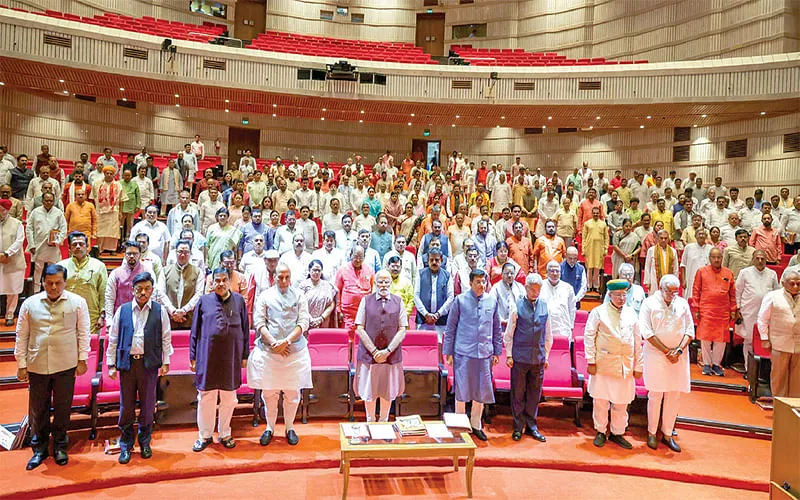On May 2-4 Prime Minister Narendra Modi will be making an important visit to Europe at a very sensitive time in the continent’s history. As a consequence of the continuing Russian invasion of Ukraine the European order, that has prevailed since decades, will undergo an inevitable change.
Modi’s trip will begin in Germany where he and some members of his cabinet will have intensive discussions with Chancellor Olaf Scholz and his colleagues on an extensive range of bilateral issues to promote meaningful cooperation between the two countries. According to the Ministry of External Affairs April 27 press release on Modi’s European visit the two “governments” will get an opportunity to “exchange views on regional and global matters of mutual interest”.
Modi will go to Denmark from Germany for a bilateral visit and also the 2nd India-Nordic summit which Denmark is organising. This visit shows that India has sadly given up any attempt to get Kim Davy, a self-confessed criminal who broke India’s laws in the Purulia arms drop case of 1996 to face Indian justice. There may be the usual assertions by government spokespeople that India will continue to pursue the issue through the Danish court system but the reality that the Danes have got what they wanted in the Kim Davy matter cannot be denied. The India-Nordic summit will see Modi interact with his counterparts from Iceland, Norway, Sweden and Finland in addition to Denmark. The press release notes that the leaders will, inter alia, discuss the “evolving global security scenario”.
On his way back to India Modi will make a brief stopover in Paris to meet President Emmanuel Macron of France. Macron has just won a second term as President and along with Scholz is the most significant European leader at this juncture. The press release also mentions that the two leaders will set “a more ambitious agenda for the two countries “strategic partnership”.
Modi and External Affairs Minister S Jaishankar have also had continuous contact with European leaders since Russia’s invasion of Ukraine. These leaders, including the President of the European Commission Ursula von der Leyen and Britain’s Prime Minister Boris Johnson have visited India. A number of European Foreign Ministers have also visited Delhi. Thus with Modi’s visit to Europe, Indian leaders would have met all the major European players. The obvious reason for this flurry of diplomatic activity is the Ukraine situation.
There is no way, despite whatever Indian diplomats may attempt to do, that Modi’s European visit will succeed in shaking off the full shadow of the European crisis which is also the prime contemporary global crisis. It is therefore remarkable that the April 27 MEA press statement does not mention the word Ukraine at all. Even if there are – and indeed there are, and will continue to be-major differences in Indian and European public approaches to the Ukraine situation, the press release’s silence about it is more than passing strange. Indeed a plain and ‘by-itself’ reading of the document begs the question if there is a Ukraine crisis and war at all.
Indeed the press release brought back memories to this writer of Myanmar in the wake of the 9/11 developments and how they were virtually ducked by that country’s media. The greater focus of the Myanmar media then was not on the horrendous terrorist attack and its international consequences but on the discovery of a white elephant which was considered to be very auspicious. Naturally the Indian system is not and will never be what was and unfortunately is the Myanmar system under the generals. It is therefore all the more important for Indian diplomats to draft media releases which do not project an oblivion of the major issues of the times. And in this age of the social media the stock diplomatic phases need to be modified and, if necessary, amplified.
Social media has changed the manner in which leaders comment on foreign policy issues. They have twitter accounts which are used to instantly convey their impressions, sentiments and views especially following meetings with their counterparts. Some of these leaders have millions of followers. Hence, the old-fashioned way when leaders left communicating the results of important bilateral meetings to foreign ministries which carefully considered each word is now becoming more and more a matter of the past. Of course it is not entirely so because whenever critical and controversial subjects come up then foreign ministries get involved and their on-the-record statements become part of the enduring record in bilateral and multilateral relations. In any event communications of whatever kind are vehicles for conveying substantive positions. This will be so during Modi’s European trip as well. Naturally, in meetings in Germany and Denmark many issues of India’s cooperation with these two countries as well as with the Nordic states will be in great focus but it is impossible to conceive that the Russian invasion of Ukraine will not figure very prominently in these interactions. Modi is unlikely to deviate from the position largely adopted after the Russian action—to stress the importance of the sovereignty of states and their territorial integrity to imply that India is not at all happy with the Russian step. However, India’s interests also demand that there is no public condemnation of Russia. There will be pressure in European mainstream and social media but India will no doubt stand its ground. But the way to do so is not by refraining from using the word Ukraine in press releases like that of April 27.
Disclaimer: The views and opinions expressed in this article are the personal opinions of the author. The facts, analysis, assumptions and perspective appearing in the article do not reflect the views of GK.







